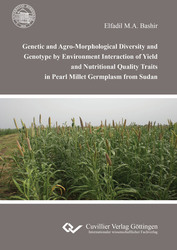| Fachbereiche | |
|---|---|
| Buchreihen (97) |
1381
|
| Nachhaltigkeit |
3
|
| Gesundheitswesen |
1
|
| Geisteswissenschaften |
2369
|
| Naturwissenschaften |
5408
|
| Mathematik | 229 |
| Informatik | 319 |
| Physik | 980 |
| Chemie | 1364 |
| Geowissenschaften | 131 |
| Humanmedizin | 243 |
| Zahn-, Mund- und Kieferheilkunde | 10 |
| Veterinärmedizin | 108 |
| Pharmazie | 147 |
| Biologie | 835 |
| Biochemie, Molekularbiologie, Gentechnologie | 121 |
| Biophysik | 25 |
| Ernährungs- und Haushaltswissenschaften | 45 |
| Land- und Agrarwissenschaften | 1005 |
| Forstwissenschaften | 201 |
| Gartenbauwissenschaft | 20 |
| Umweltforschung, Ökologie und Landespflege | 148 |
| Ingenieurwissenschaften |
1795
|
| Allgemein |
98
|
|
Leitlinien Unfallchirurgie
5. Auflage bestellen |
|
Erweiterte Suche
Genetic and Agro-Morphological Diversity and Genotype by Environment Interaction of Yield and Nutritional Quality Traits in Pearl Millet Germplasm from Sudan
Elfadil M A Bashir (Autor)Vorschau
Inhaltsverzeichnis, PDF (72 KB)
Leseprobe, PDF (120 KB)
Due to its adaptation to extremely harsh environments, pearl millet (Pennisetum glaucum (L) R. Br.) is one of the most important staple cereals cultivated in the arid and semi-arid tropics of Asia and Africa. In these regions pearl millet is mainly produced under low-input, rainfed conditions in traditional farming systems, where several constrains are affecting pearl millet production, such as inter-annual rainfall variability, pests, diseases, Striga and use of low yielding varieties. The majority of the human population in these regions is affected by nutritional deficiencies of essential minerals causing micronutrient malnutrition (so-called ‘hidden hunger’). Plant genetic resources provide basic materials for selection and improvement of crop productivity through the optimal design of breeding programs to meet food security needs of the world’s rapidly rising population. The advent of PCR-based molecular markers such as simple sequence repeats (SSRs) has created an opportunity for fine-scale genetic characterization of germplasm collections. Understanding the structure of diversity and the identification of distinct materials with complementary traits for recombination by crossing provides the foundation for effective and sustained pearl millet population breeding and synthetic and hybrid development, based on the concept of heterotic groups in this allogamous crop.
| ISBN-13 (Printausgabe) | 9783736990302 |
| ISBN-13 (E-Book) | 9783736980303 |
| Buchendformat | A5 |
| Sprache | Englisch |
| Seitenanzahl | 142 |
| Auflage | 1. Aufl. |
| Erscheinungsort | Göttingen |
| Promotionsort | Hohenheim |
| Erscheinungsdatum | 22.06.2015 |
| Allgemeine Einordnung | Dissertation |
| Fachbereiche |
Land- und Agrarwissenschaften
|








